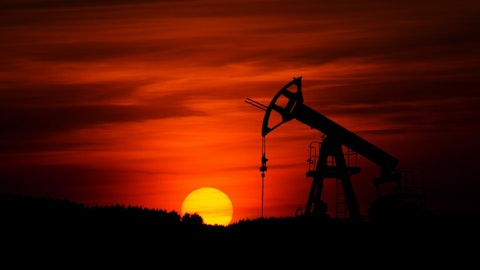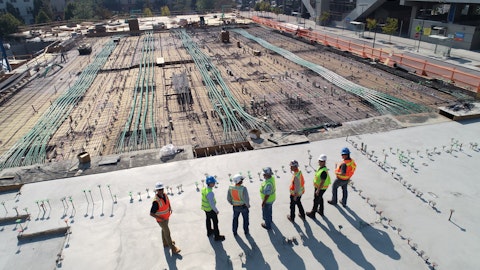Mark LaVerghetta: I will touch on the first one first. So, obviously on the importing of ores to our Kentucky Lithium site, yes. We have received preliminary approval to advance to the next stage under IRA compliance. Most people don’t think it is an application based process, but it is, and we are working with the DOE on that. We have gotten through the first phase of that process which opens us up to go to the second phase, which we are super excited about. Steven Frankowski and our team did an absolutely amazing job with that. And so we, yes, we do believe that given the high value aspect of refining in country, we will enable it to qualify. Now, we also are working with the government on operations that we would build within Africa, because our model is to go to Africa, to build within the local environment with partners, being project financed over within Africa with local sources as well, and local partners, so that ultimately we are sharing in the risk and we are aligning the interest of the parties there.
So I mean, IRA compliance is a big deal, especially in the automotive. But now we also focus a lot on the LFP market, which is a lot of energy storage, which represents over 70% of the battery market today. We are the only company that we know of in the U.S. that can refine LFP batteries at scale, cost effectively and make money doing it, let alone obviously the ore business we are doing. But yes, we do believe based on that, we will qualify. We are working with them on the applicant operations. If we bring it back here to our cathodic active material partners, would that qualify for IRA? We are working with the government on that. We are uncertain on that aspect. But not necessarily needed for all applications, not needed for energy storage in some of those markets that are already building out substantial amount of batteries, and it gives us the ability to scale quickly.
The one project in Africa I just came back from in West Africa could represent first year of operations, which will take time to build and everything to that extent could be well over $350 million in revenue to us as a business and the ability to significantly scale it beyond that, that is one project out of many that we are working on in that market. And I apologize. What was your second question?
Keith Goodman: Would you have to pay for the ownership of those assets?
Mark LaVerghetta: So I’m not going to give you all my negotiating strategy away. But, we will leverage our partnership with ReElement, which will enable American Resources to get a very attractive opportunity to take an equity ownership in these mines. Now, why is that important? One, you read a lot of negativity about mines in Africa and I have been to a bunch of them recently. They are not all being run-in an unethical way. There is actually a substantial amount of mechanization. There is a substantial amount of ethical mining and/or small scale mining that is done ethically. But as we expand ReElement, we want to also make sure that, we are protecting the interest of ReElement and making sure that where our sources are also doing it right, not only from an ethical perspective but also being done from a safety perspective and from a productivity perspective so we can get as much feedstock as we can so we can grow our business as fast as we can.
I’m proud to say American Resources under our Mining Department Division, we won the Sentinel Safety Award once and we have been nominated twice, which is the highest safety award you can get within the Federal Government of the United States. We are going to bring those same aspects to the international locations that we are partnering with. Now, will we pay something for them? Possibly, yes. We will invest into them. I feel like given the time of what we are doing and the work and we are doing in place and bringing equipment over there and stuff to that nature will be methods of gaining interest in these mines. Now, we won’t run the mines. Our goal is not to operate mines within Africa, but it is to take an influential position within the mines to protect our interests and protect our future supply chains.
Keith Goodman: So all of the above…
Mark LaVerghetta: Yes, the quick answer is all of the above. There will be some cash consideration. There will be in kind of. There will be refining capacity we are bringing to the table and stuff of that nature.
Keith Goodman: Okay. And I have been reading recently some coal miners here or companies that own some coal assets here are claiming rare earth critical element on some of these properties, which leads to the question, do your coal mine, coal asset properties have rare earth critical elements on it? And isn’t there some value to your property with that as well?
Mark LaVerghetta: Santa Claus just came to the coal market. Every coal business is worth billions of dollars now, basically is what they are saying. Nothing against, they are great guys. I know them. They have done a good job on the mining side, on the coal side. Every coal property has essentially, not every, a lot of coal properties have that same characteristic. It is nothing new. Cool that, rare earth elements, lithium for that matter is in your backyard in a parts per million basis. Now, if that property is worth $37 billion, that is phenomenal that every coal business in the country is now worth a lot more money because most coal companies have – present on the overburden, underburden including ours which we own. We are one of the largest mining companies in Eastern Kentucky from an infrastructure perspective.
And we have sampled, we worked with Penn State three years ago to do an extensive study on all of our rare earth reserves and lithium reserves at our properties. And we had, most of the properties we sampled were actually higher grades than what they reported. And so yes, we have those exact same things. Now, my opinion is, it is very, very challenging to focus exclusively on mining rare earth elements from unconventional sources. Now, so as a mining operation, you are not going to go somebody, they are not going to go mine that operation just to extract the rare earth elements. They will never make money doing it. Our opinion is you can use byproduct economics and you can actually make money. We are going to showcase that in West Virginia, using byproduct economics extract a valuable resource, which is your met carbon.



